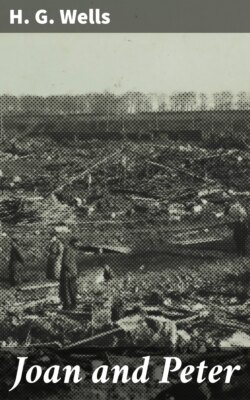Читать книгу Joan and Peter - H. G. Wells - Страница 32
На сайте Литреса книга снята с продажи.
§ 7
ОглавлениеTable of Contents
Joan and Peter remained unaware of the great destinies before them. More observant persons than they were might have guessed there were deep meanings in the way in which Aunt Phœbe smoothed back their hair from their foreheads and said “Ah,” and bade them “Mark it well” whenever she imparted any general statement, but they took these things merely as her particular way of manifesting the irrational quality common to all grown-up people. Also she would say “Dignity! Your mission!” when they howled or fought. It was to the manuscript that grew into a bigger and bigger pile upon what had been Arthur’s writing-desk in Arthur’s workroom, that she restricted her most stirring ideas. She wrote there daily, going singing to it as healthy young men go singing to their bathrooms. She splashed her mind about and refreshed herself greatly. She wrote in a large hand, punctuating chiefly with dashes. She had conceived her book rather in the manner of the prophetic works of the admired Mr. Ruskin—with Carlylean lapses. It was to be called Hail Bambino and the Grain of Mustard Seed. It was all about the tremendousness of children.
The conscientious valiance of Aunt Phœbe was very manifest in the opening. “Cæsar,” the book began, “and the son of Semele burst strangely into this world, but Jesus, Mohammed, Confucius, Newton, Darwin, Robert Burns, were born as peacefully as you or I. Nathless they came for such ends—if indeed one can think of any ending thereto!—as blot out the stars. Yesterday a puling babe—for Jesus puled, Mohammed puled, let us not spare ourselves, Newton, a delicate child, puled most offensively—Herod here and bacteria there, infantile colic, tuberculosis and what not, searched for each little life, in vain, and so today behold springing victoriously from each vital granule a tree of Teaching, of Consequence, that buds and burgeons and shoots and for ever spreads so that the Gates of Hell may not prevail against it! Here it is the Tree of Spirituality, here the Tree of Thought, predestined intertwiner with the Tree of Asgard, here in our last instance a chanting Beauty, a heartening lyrical Yawp and Whirlaboo. And forget it not, whatever else be forgotten, the Word of the Wise, ‘as the twig is bent the tree inclines.’ So it is and utterly that we realize the importance of education, the pregnant intensity of the least urgency, the hint, the gleam, the offering of service, to these First Tender Years.”
Here Aunt Phœbe had drawn breath for a moment, before she embarked upon her second paragraph; and here we will leave Aunt Phœbe glowing amidst her empurpled prose.
Joan and Peter took the substitution of Aunt Phœbe muttering like a Sibyl overhead and Aunt Phyllis, who was really amusing with odd drawings and twisted paper toys and much dancing and running about, in the place of Daddy and Mummy, with the stoical acceptance of the very young. About Daddy and Mummy there hung a faint flavour of departure but no sense of conclusive loss. No clear image and expectation of a return had been formed. No day of definite disappointment ever came. After all the essential habitual person, Mary, was still there, and all the little important routines of child-life continued very much as they had always done.
Yet there was already the dawn of further apprehensions in Peter’s mind at least. One day Peter picked up a dead bird in the garden, a bird dead with no injuries manifest. He tried to make it stand up and peck.
“It ain’t no good, Master Peter; it’s dead,” said Mary.
“What’s dead?” said Peter.
“That is.”
“Gone dead,” said Peter.
“And won’t ever go anything else now—except smell,” said Mary.
Peter reflected. Later he revisited the dead bird and was seen in profound meditation over it. Then he repaired to Aunt Phyllis and confided his intention of immortality.
“Peter,” he said, “not go dead—nohow.”
“Of course not,” said Aunt Phyllis. “He’s got too much sense. The idea!”
This was reassuring. But alone it was not enough.
“Joan not go dead,” he said. “No.”
“Certainly she shan’t,” said Aunt Phyllis and awaited further decisions.
“Pussy not go dead.”
“Not until ninety times nine.”
“Aunt Phyllis not go dead. Marewi not go dead.”
He reflected further. He tried, “Mummy and Daddy not go dead....”
Then after thought, “When are Daddy and Mummy coming back again?”
Aunt Phyllis told a wise lie. “Some day. Not for a long time. They’ve gone—oh, ever so far.”
“Farther than ever so,” said Peter.
He reflected. “When they come back Peter will be a Big Boy. Mummy and Daddy ’ardly know ’im.”
And from that time, Daddy and Mummy ceased to be thought of further as immediate presences, and became hero and heroine in a dream of tomorrow, a dream of returning happiness when life was dull, of release and vindication when life was hard, a pleasant dream, a hope, a basis for imaginative anticipations and pillow fairy tales, sleeping Parents like those sleeping Kings who figure in the childhood of nations, like King Arthur or Barbarossa. Sometimes it was one parent and sometimes it was the other that dominated the thought, “When Mummy comes back.... When Daddy comes back.”
Joan learnt very soon to say it too.
